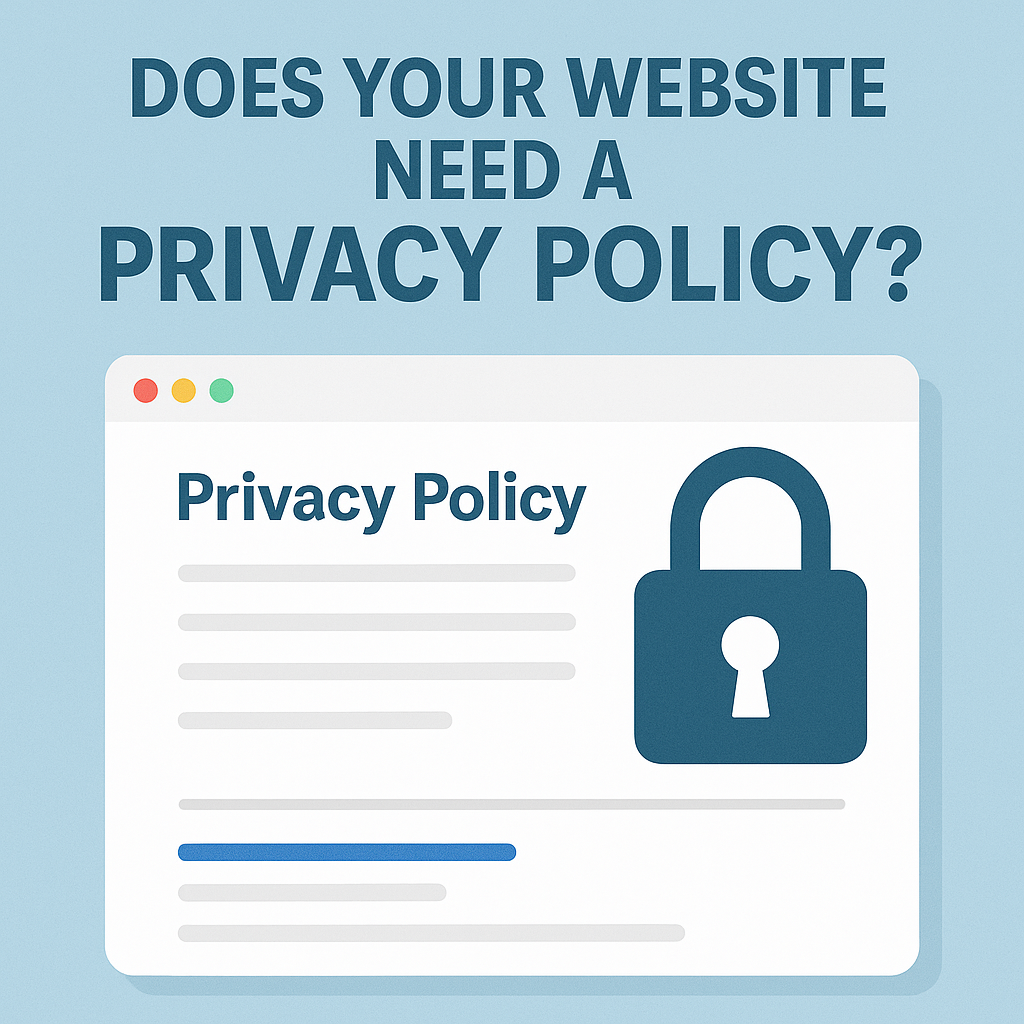Table of Contents
- Why Your Website Needs a Privacy Policy
- Key Legal Drivers: CCPA, VCDPA & Beyond
- What Your Privacy Policy Must Include
- Common Risks of Missing It
- Tips & Best Practices
- How JSH Can Help You Be Compliant & Trusted
Why Your Website Needs a Privacy Policy
Some business owners ask: “If I don’t collect personal info, do I still need one?” The safe answer: yes. A privacy policy does more than satisfy laws—it builds credibility and trust.
Consider these data points:
- 92% of Americans report being concerned about their privacy when using the internet.
- 86% of U.S. adults say data privacy is a growing concern for them.
- 56% of Americans admit they click “agree” without reading privacy policies.
Those numbers matter. When visitors see a clear, accessible privacy policy, they’re more likely to trust you. When it’s missing or vague, suspicion or friction can creep in.
Key Legal Drivers: CCPA, VCDPA & Beyond
In the U.S., a growing number of states have enacted or are enacting privacy laws. Two that already matter to many businesses are the California Consumer Privacy Act (CCPA) and the Virginia Consumer Data Protection Act (VCDPA).
CCPA / CPRA
Under CCPA (and its amendment CPRA), California consumers have rights to:
- Know what personal data is collected, used, or sold.
- Request deletion of personal data.
- Opt out of the sale or sharing of their information.
- Correct inaccurate personal data (under CPRA).
Businesses subject to CCPA must present a conspicuous “Do Not Sell My Personal Information” link and ensure consumers can exercise rights without discrimination.
VCDPA (Virginia)
The VCDPA went into effect January 1, 2023, and applies to businesses that (a) do business in Virginia or market to VA residents, and (b) control or process data of 100,000+ consumers or derive a threshold revenue from data functions.
Under VCDPA, a privacy notice must be:
- Reasonably accessible, clear, and meaningful.
- Include categories of personal data, purpose of processing, third-party sharing, and how consumers can exercise their rights.
- Offer a way for consumers to submit requests (e.g. access, deletion) through secure, reliable means.
- Respond to most consumer requests within 45 days (with possible extension).
Unlike CCPA’s explicit “point of collection” notices, VCDPA is more flexible on timing but still demands transparency.
Other Laws & Expectations
Many other state laws or proposals (e.g. California’s CalOPPA, upcoming state privacy bills) require or encourage privacy disclosure.
Even in states without robust laws, having a privacy policy helps you comply with general consumer protection, data breach obligations, and third-party service requirements (e.g. ad networks, payment gateways).
What Your Privacy Policy Must Include
Your policy should be tailored to what your site actually does. Here are core components every policy should cover:
- What personal data you collect (name, email, IP, tracking, cookies, etc.)
- How data is used & processed (analytics, marketing, third parties)
- Legal bases or justification (consent, legitimate interest, etc.)
- Third-party sharing & disclosure (partners, advertisers, service providers)
- Consumer rights & how to exercise them (access, correction, deletion, opt-out) under CCPA/VCDPA, etc.
- Data retention policies (how long you keep data, when you delete it)
- Security measures (how you protect data)
- Updates & versioning (how you notify users of changes)
- Contact information (how users can reach you or submit requests)
Some laws require extra elements. For example, CCPA expects “notice at point of collection” in many cases, and a “Do Not Sell” mechanism if personal data is sold or shared.
Common Risks of Missing It
Not having a privacy policy, or having a poor one, can lead to several problems:
- Regulatory liability & fines: You may face penalties under CCPA, VCDPA, or future state privacy laws.
- Contract or platform restrictions: Many third-party services (ad networks, APIs) demand a valid privacy policy.
- Broken trust: Visitors who don’t see transparency may bounce or avoid giving information.
- Litigation & complaints: Consumers or authorities could interpret omission as deceptive practice.
Research shows that among 1,000+ audited websites, fewer than 15% of third-party data flows were properly disclosed in privacy policies.
Tips & Best Practices
- Use clear, plain language—avoid dense legal jargon.
- Place a link in your footer and at points of data collection (sign-up forms, checkout pages).
- Keep it up to date: set a regular review interval and reflect changes in your business or law.
- Don’t overpromise; describe only what you really do with the data.
- Provide easy mechanisms for users to make requests (web forms, email). Ensure you can authenticate identities.
- If you sell or share data, display a “Do Not Sell My Personal Information” link (for jurisdictions like California).
- Consider alignment with global standards (like GDPR) preemptively, especially if you have international visitors.
How JSH Can Help You Be Compliant & Trusted
At JSH (JSH Web Designs), we understand that a privacy policy is not just compliance — it’s trust. Whether you’re in Knoxville, anywhere in Tennessee, or across the U.S., our services include:
- Privacy policy drafting and customization, tailored to your data flows and legal obligations
- Review & update audits as laws evolve (CCPA/CPRA, VCDPA, new state laws)
- Integration into your website UX (footers, modals, forms) to prompt data disclosures
- Support handling consumer data rights requests and building backend workflows
- Strategic planning to minimize liability and maximize user trust in your digital presence
If you’re ready to make your website legally safe and user-friendly, contact JSH. Let us help you design with confidence, comply with privacy laws, and earn trust from day one.
Author
-

Founder of JSH Web Designs, a website design firm and digital marketing agency in Knoxville. Overseeing day-to-day operations with a focus on website development and marketing to ensure our clients have the tools necessary to succeed in their vertical with data/result-driven strategies and technologies.



